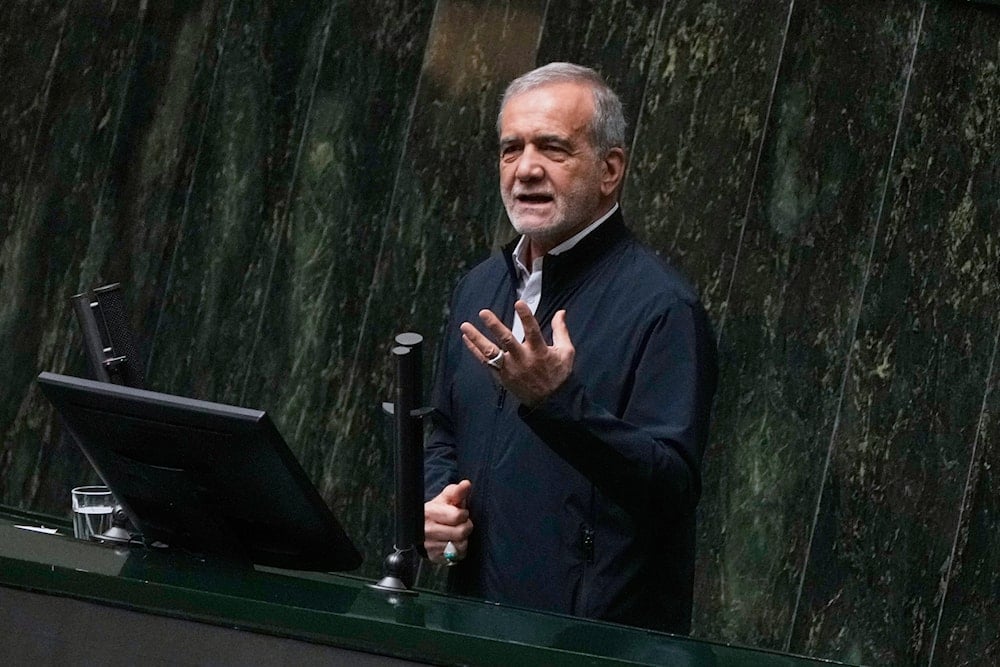Armenia's clarifications ease Iran concerns over Caucasus: Pezeshkian
Iran's president praises Iran-Armenia ties, noting reduced concerns in the Caucasus and urging stronger trade and transport cooperation.
-

Iranian President Masoud Pezeshkian speaks during a memorial at the parliament in Tehran, Iran, Wednesday, May 21, 2025 (AP)
Iranian President Masoud Pezeshkian, during his meeting with the Secretary of the Armenian Security Council, Armen Grigoryan, in Tehran on Saturday, noted that his country's concerns in the Caucasus region have largely subsided, particularly regarding the issue of foreign military presence in this sensitive area.
Pezeshkian attributed this sense of reassurance to the "explanations and assurances provided by Armenian officials." The Iranian president praised the bilateral relations between the two countries, stressing that any external force must be prevented from influencing these "friendly and strategic" ties. Pezeshkian noted that this visit would help accelerate the implementation of bilateral agreements, particularly in the transportation sector.
He also emphasized the need to pave the way for a further expansion of trade and joint investment cooperation between Iranian and Armenian business leaders.
Iran rejects geopolitical changes in the Caucasus
Iran’s Secretary of the Supreme National Security Council, Ali Larijani, articulated Tehran's firm opposition to any actions that could lead to geopolitical shifts within the Caucasus region, while simultaneously expressing his country's support for the inclusion of Armenia into a major transit corridor that passes through the Islamic Republic, thereby connecting the nations to its north with the Sea of Oman.
During a meeting in Tehran on Saturday with Armen Grigoryan, Larijani, Iran's top security chief, expressed Tehran’s satisfaction with the current level of bilateral relations across economic, political, security, and defense domains, while also emphasizing the importance of cooperation with its northern neighbor to complete the North-South Transport Corridor.
Larijani also declared Iran’s support for peace dialogue between Armenia and Azerbaijan, elaborating on the Islamic Republic’s theory of regional peace and stability by stating that Iran has always supported the independence and strength of regional countries to ensure lasting security.
Armenian Security Council secretary hails Iran-Armenia relations as unprecedented
For his part, Grigoryan hailed the bilateral relations as unprecedented, stating that his visit to Tehran aims to expand ties in various spheres and adding that Armenia seeks to sign a comprehensive strategic partnership document with Iran in the near future.
The secretary of the Security Council of Armenia stressed that his country attaches paramount significance to the principles of national sovereignty, respect for territorial integrity, the exercise of national judicial jurisdiction, the inviolability of borders, and reciprocity.
Grigoryan also stated that Yerevan is ready to provide the necessary guarantees to Tehran to ensure that relations between Iran and Armenia will not be harmed, underlining Armenia’s inherent opposition to regional geopolitical changes.
The top Armenian security official also stressed that in the course of peace negotiations with Azerbaijan, the agreements clearly preserved Armenia’s exclusivity in security, military, and customs issues.
Armenia, Iran sign MoUs in light of US-mediated deal
Earlier on August 19, during a key state visit by Iranian President Masoud Pezeshkian, Iran and Armenia signed 10 memoranda of understanding (MoUs) to expand their bilateral cooperation.
The documents were signed in Yerevan on Tuesday after President Pezeshkian and Armenian Prime Minister Nikol Pashinyan held a private meeting; these MoUs, which cover a range of sectors, represent a significant step in strengthening ties between the two neighboring countries.
The MoUs, which span multiple areas including diplomacy, economic policy, mining, industry, infrastructure, healthcare, environmental protection, education, culture, civil society, and tourism, were accompanied by a joint statement signed by Pezeshkian and Pashinyan that emphasizes cooperation and partnership.
The visit came shortly after a United States-mediated peace deal was signed between Armenia and Azerbaijan in Washington, in the presence of President Donald Trump. The agreement reportedly included plans for a new transit road linking the two countries.
While Iran has welcomed peace in the region, it has also warned of the consequences of foreign intervention. Tehran has emphasized its commitment to monitoring developments closely to prevent what it considers external meddling.
On August 11, Pezeshkian addressed concerns about the US-mediated deal, dismissing what he described as media “overstatements.” He asserted that Iran’s demands, respect for sovereignty, territorial integrity, and opposition to border changes, had been met.

 4 Min Read
4 Min Read








